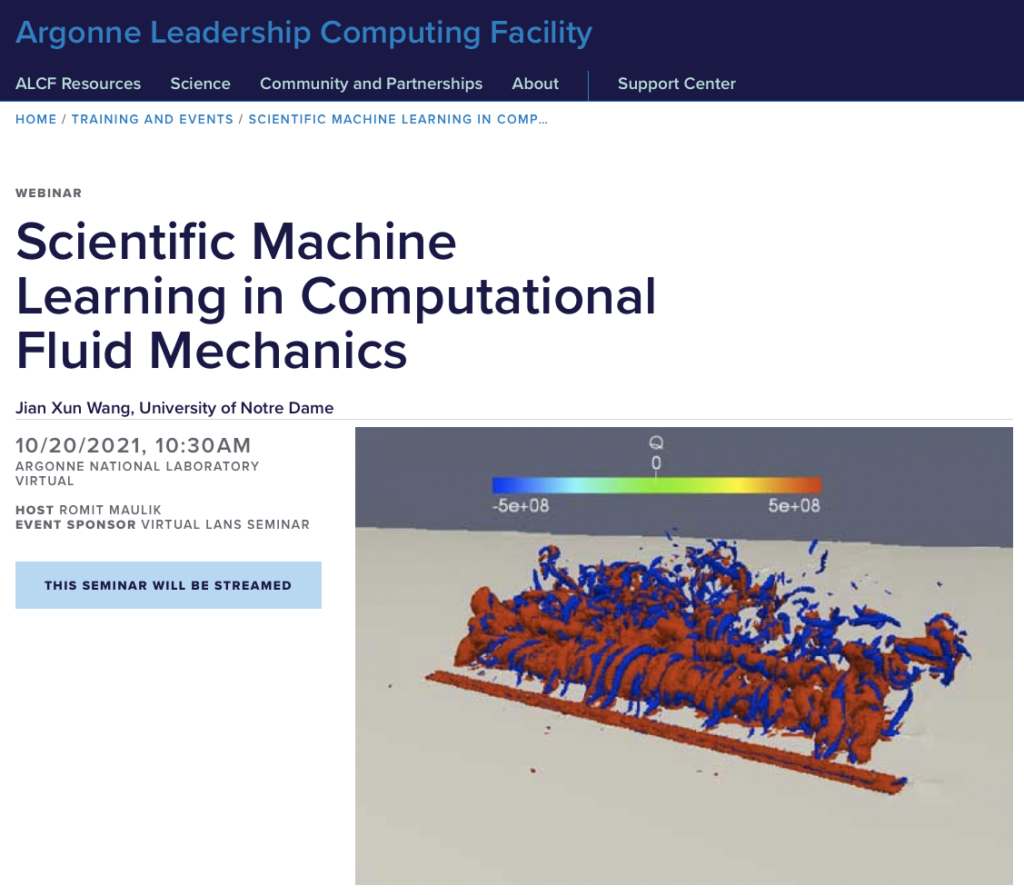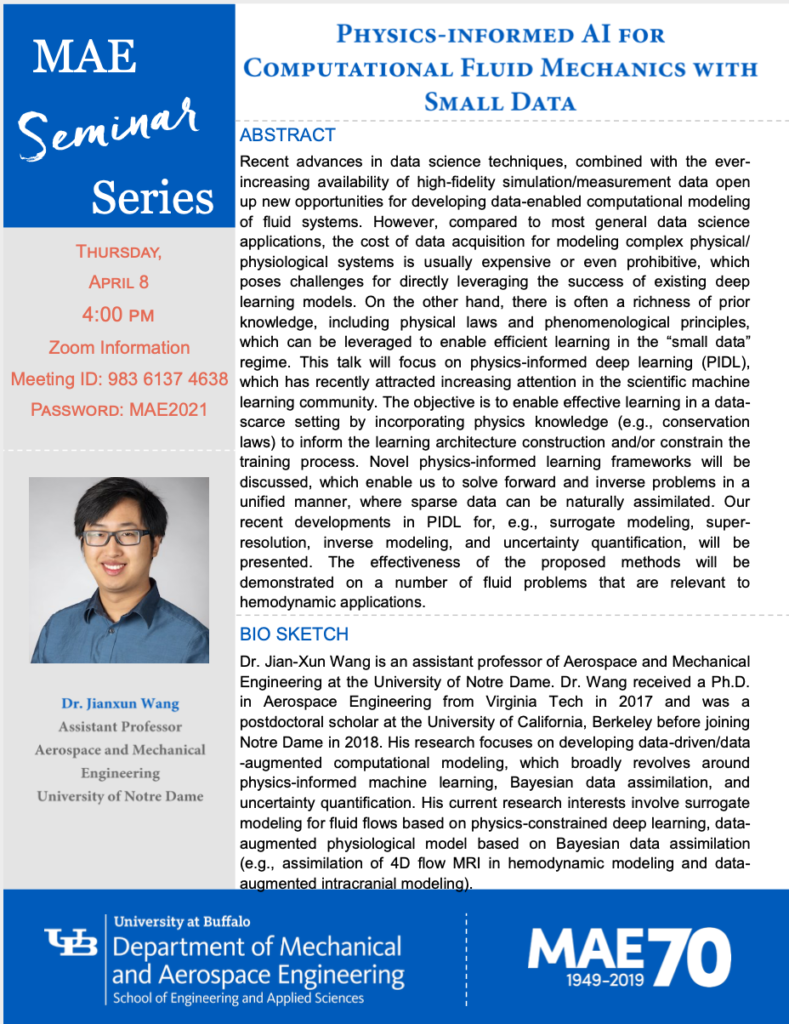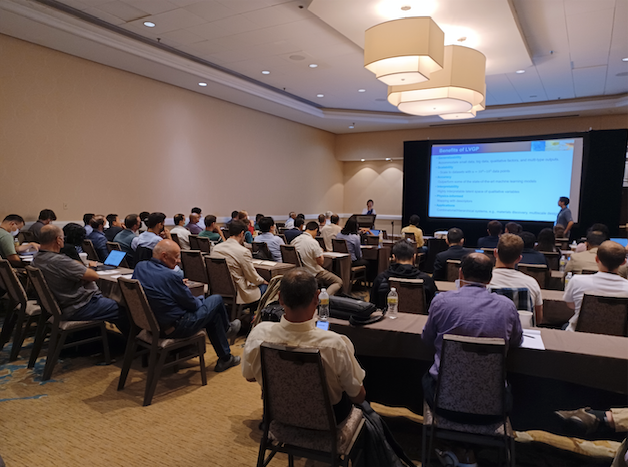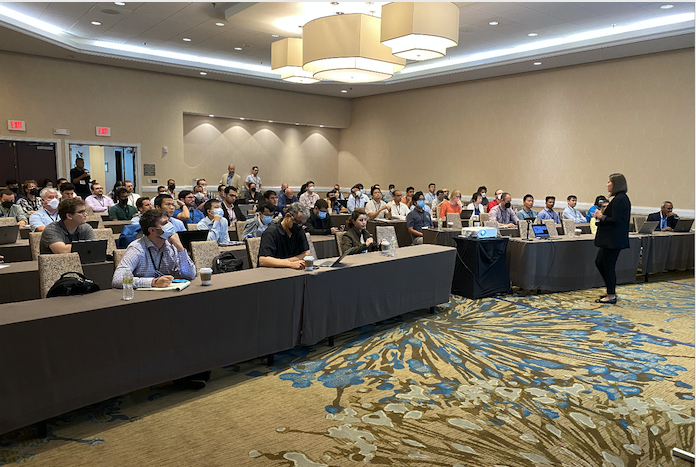Category: Seminar
Organized USACM Thematic Conference on UQ and SciML
Invited Talk at USACM UQ Virtual Seminar Series
I will give invited talk at #USACM#UQ Virtual Seminar Organized by USACM UQ TTA. (Time: 15:00 PM-16:00 PM (EST US), 5/12/2022. Zoom Link: listed below). The topic is about “how to leverage physics in ML for computational mechanics — Physics-informed, PDE-structure preserved Learning for problems with complex geometries”. I am happy to have Prof. Michael Brenner be my discussant sharing his great insights in the field of scientific machine learning #SciML. Also thank the organization committee: Abani Patra, Serge Prudhomme, Johann Guilleminot.
In this talk, I will discuss our recent developments of on SciML from several different aspects, including (1) how to leverage physics to inspire network architecture design (PDE-preserved deep learning #PPNN), (2) use physics to inform network training #PINN, (3) physics-informed geometric deep learning (#GeometricDL) for complex geometries and irregular domains. This work is supported National Science Foundation (NSF)#OAC#CMMI, Aerospace & Mechanical Engineering at Notre Dame, Center for Sustainable Energy at Notre Dame, ND-ECI, ND Lucy Institute of Data Science.
Welcome to join us at https://lnkd.in/gH6AHp3V. See you on Thursday
Here is the talk recording
Give a seminar talk @ ANL

Will host a MS at USNCCM16 and our group will give 3 presentations

Together with Danial, Kathryn, Alireza, and Hao, we will co-host a mini-sympoisum entiled Physics-Informed Learning and Data-Enabled Predictive Modeling and Discovery of Complex Systems, where 15 speakers will give excellent talks on scientific machine learning and data-driven predictive modeling. (10:00-18:00 (UTC), 07/26/2021). Please check out.
Our group will also give 3 talks at USNCCM:
- 14:00-14:20 (UTC) 07/27/2021: X.-Y. Liu* and J.-X. Wang, Physics-informed model-based deep reinforcement learning for dynamic control.
- 17:20-17:40 (UTC) 07/27/2021: P. Du*, X. Zhu, J.-X. Wang, Surrogate modeling for 3-D patient-specific hemodynamics using statistical shape modeling and deep learning
- 15:00-15:20 (UTC) 07/27/2021: J.-X. Wang*, H. Gao, L. Sun, Physics-informed discretization-based learning: a unified framework for solving PDE-constrained forward and inverse problems
Will host a mini-symposium at SIAM AN 21 (July 19-23), and Xinyang will give a presentation on MBRL for control.

Together with Prof. Huan Xun@University of Michigan, we will host a two-section mini-symposium (MS48) entiled: Physics-aware machine learning for solving and discovering PDEs, part I (MS48) and part II (MS105)
Part I (MS 48), Tuesday, July 20
- 4:30-4:55 Deep Neural Network Modeling of Unknown PDEs in Nodal Space abstract Zhen Chen, Ohio State University, U.S.;
 Victor Churchill, Dartmouth College, U.S.; Kailiang Wu and Dongbin Xiu, Ohio State University, U.S.
Victor Churchill, Dartmouth College, U.S.; Kailiang Wu and Dongbin Xiu, Ohio State University, U.S. - 5:00-5:25 Deep Learning Methods for Discovering Physics from Data abstract Joseph Bakarji, Jared L. Callaham, and Kathleen Champion, University of Washington, U.S.; J. Nathan Kutz, University of Washington, Seattle, U.S.; Steve Brunton, University of Washington, U.S.
- 5:30-5:55 Data-Driven Learning of Nonlocal Models:from High-Fidelity Simulations to Constitutive Laws abstract Yue Yu and Huaiqian You, Lehigh University, U.S.; Stewart Silling and Marta D’Elia, Sandia National Laboratories, U.S.
- 6:00-6:25 Physics-informed Dyna-Style Model-Based Deep Reinforcement Learning for Dynamic Control abstract
 Xinyang Liu and Jianxun Wang, University of Notre Dame, U.S.
Xinyang Liu and Jianxun Wang, University of Notre Dame, U.S.
Part II (MS 105), Friday, July 23
- 3:30-3:55 Optimal Experimental Design for Variational System Identification of Material Physics Phenomena abstract Wanggang Shen, Zhenlin Wang, Krishna Garikipati, and
 Xun Huan, University of Michigan, U.S.
Xun Huan, University of Michigan, U.S. - 4:00-4:25 Learning Stochastic Closures Using Sparsity-Promoting Ensemble Kalman InversionabstractJinlong Wu, Tapio Schneider, and Andrew Stuart, California Institute of Technology, U.S.
- 4:30-4:55 PhyCRNet: Physics-Informed Convolutional-Recurrent Network for Solving Spatiotemporal PDEsabstract
 Pu Ren and Chengping Rao, Northeastern University, U.S.; Jianxun Wang, University of Notre Dame, U.S.; Yang Liu and Hao Sun, Northeastern University, U.S.
Pu Ren and Chengping Rao, Northeastern University, U.S.; Jianxun Wang, University of Notre Dame, U.S.; Yang Liu and Hao Sun, Northeastern University, U.S. - 5:00-5:25 Practical Uncertainty Quantification for Learning Partial Differential Equations from Data with Deep EnsemblesabstractSteven Atkinson and Panagiotis Tsilifis, GE Global Research, U.S.
Give a seminar talk at Intelligent and Bio-inspired Mechanics (IBiM) Seminar
Give a Seminar Talk at SUNY Buffalo, MAE Dept.

Our group will give 3 talks and a poster at SIAM CSE 2021
I will organize a mini-symposium entitled “Physics Informed Learning for Modeling and Discovery of Complex Systems” Parts I and II on 03/03/2021 at SIAM CSE. Moreover, our group will also give several talks at CSE21.
MS Talk: Wang et al. Physics-Informed Discretization-Based Learning: a Unified Framework for Solving PDE-Constrained Forward and Inverse Problem (2:15-2:30 CST, 03/03/2021) https://meetings.siam.org/sess/dsp_talk.cfm?p=108358
MS Talk: Han et al. Suppreresolution and Denoising of Flow Imaging using Physics-Constrained Discrete Learning (4:35-4:50 CST, 03/01/2021) https://meetings.siam.org/sess/dsp_talk.cfm?p=108020
MS Talk: Sun et al. System Identification by Sparse Bayesian Learinng (5:35-5:50 CST, 03/04/2021) https://meetings.siam.org/sess/dsp_talk.cfm?p=108437
Poster: Pan et al. Patient-Specific CFD Modeling of Aortic Dissection Augmented with 4D Flow MRI https://meetings.siam.org/sess/dsp_talk.cfm?p=110813
Our group will give 4 talks at 73rd Annual Meeting of APS Division of Fluid Dynamics
| Please check out our presentations at APS DFD: R01.00011: Super-resolution and Denoising of Fluid Flows Using Physics-informed Convolutional Neural Networks Jian-Xun Wang, Han Gao, Luning Sun R01.00038: A unifying framework of solving forward and inverse problems in fluid mechanics via deep learning Han Gao, Jian-Xun Wang R10.00002 Physics-constrained multi-fidelity convolutional neural networks for surrogate fluid modeling Luning Sun, Han Gao, Jian-Xun Wang W07.00012 Computational simulation of aortic dissection with a comparison with 4D flow MRI Pan Du, Nicholas Burris, Julio Sotelo, Jian-Xun Wang http://meetings.aps.org/Meeting/DFD20/Content/3927 |

